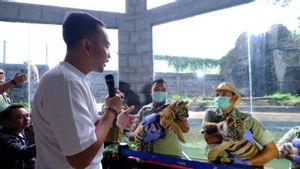JAKARTA - While the world is busy with the COVID-19 pandemic, there is now concern about the threat of another pandemic, namely the Nipah virus from Malaysia.
Quoted from the official website of the World Health Organization (WHO), Thursday, January 28, the Nipah virus (NiV) is categorized as a zoonotic virus that is transmitted by animals to humans. The virus can also be transmitted through contaminated food or directly between humans.
As reported by VOI, the percentage of deaths from the Nipah virus can reach 40 to 75 percent. Until now, the Nipah virus vaccine has not been found by a team of experts.
The Ministry of Health's Director of Prevention and Control of Vector Infectious and Zoonotic Diseases, Didik Budijanto, appealed to Indonesians to always be aware of the potential for transmission of the Nipah virus through pigs in Malaysia.
Steps that the community can take to prevent the spread and transmission of the Nipah virus include:
- Wash your hands regularly with soap and water.
- Avoid contact with sick bats or pigs.
- Avoid areas where bats usually live.
- Avoid consuming raw date palm juice.
- Avoid eating fruit that has the potential to be contaminated by bats.
- Avoid contact with blood or body fluids that are suspected of being infected with NiV.
These methods are carried out when someone is in an area that has been infected with the Nipah virus outbreak such as Bangladesh, Malaysia, India, and Singapore.
The Nipah virus can also be transmitted from human to human. Therefore, it is important to implement standard infection control practices and appropriate barrier treatment techniques to prevent hospital-acquired infections (nosocomial transmission).
Geographical location has a possible risk of future outbreaks of Nipah virus, such as the area where flying foxes (bat genus Pteropus) live. This type of bat is currently found in Cambodia, Indonesia, Madagascar, the Philippines, and Thailand.
People visiting that area should immediately take the same precautions as those living in areas where an outbreak has occurred.
The English, Chinese, Japanese, Arabic, and French versions are automatically generated by the AI. So there may still be inaccuracies in translating, please always see Indonesian as our main language. (system supported by DigitalSiber.id)









